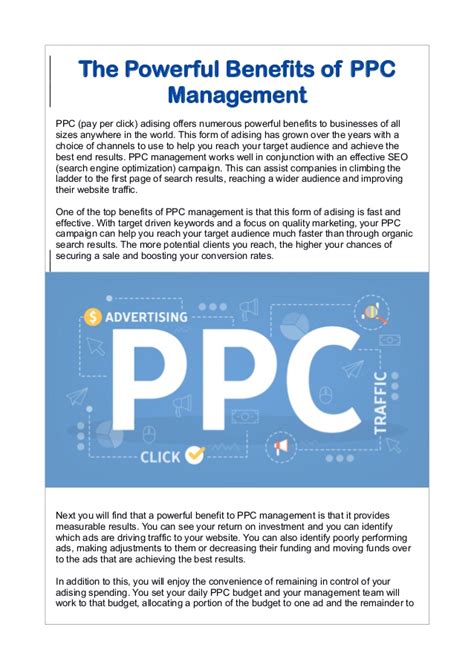What Is PPC Management, and How Does It Benefit?

Are you looking to maximize your online advertising efforts? Do you want to ensure that your pay-per-click (PPC) campaigns are running smoothly and effectively? If so, then PPC management is the solution for you.
What is PPC Management?
PPC management refers to the process of overseeing and optimizing pay-per-click advertising campaigns. It involves managing the strategy, budget, bidding, and performance of PPC ads across various platforms, such as Google Ads, Bing Ads, and social media platforms.
The Purpose of PPC Management
The main purpose of PPC management is to drive targeted traffic to a website or landing page, increase brand visibility, and generate leads or conversions. It is a cost-effective way to reach a specific audience and achieve measurable results.
Benefits of PPC Management
1. Increased Visibility
By utilizing PPC management, your ads will be displayed prominently on search engine results pages (SERPs) and other relevant websites, ensuring increased visibility and exposure for your brand.
2. Targeted Advertising
With PPC management, you can target specific keywords, demographics, locations, and interests, ensuring that your ads are shown to the right audience at the right time. This helps to maximize your return on investment (ROI) and improve conversion rates.
3. Cost Control
PPC management allows you to set a budget for your campaigns and control your ad spend. You only pay when someone clicks on your ad, making it a cost-effective advertising strategy.
4. Measurable Results
One of the key benefits of PPC management is that it provides measurable results. You can track the performance of your campaigns in real-time and make data-driven decisions to optimize your ads for better results.
5. Quick Results
Unlike organic search engine optimization (SEO) which takes time to generate results, PPC management can deliver immediate results. Once your campaigns are set up, your ads can start appearing on search engine results pages and driving traffic to your website almost instantly.
6. A/B Testing
PPC management allows you to conduct A/B testing to identify the best performing ads and landing pages. By testing different variations of your ads, you can optimize your campaigns for maximum performance and improve your conversion rates over time.
7. Competitive Advantage
By investing in PPC management, you can gain a competitive advantage over your competitors. It allows you to outbid them for top ad positions and appear above their organic search results, increasing your chances of attracting potential customers.
8. Remarketing Opportunities
With PPC management, you can leverage remarketing or retargeting techniques to reach users who have previously visited your website or interacted with your brand. This helps to reinforce your message and increase the likelihood of conversion.
9. Expertise and Guidance
PPC management services are usually provided by experienced professionals who have in-depth knowledge of the industry. They can provide you with expert advice, guidance, and strategies to optimize your campaigns and achieve your advertising goals.
10. Time and Resource Savings
Managing PPC campaigns can be time-consuming and resource-intensive. By outsourcing your PPC management, you can free up valuable time and resources to focus on other aspects of your business, while ensuring that your advertising efforts are in safe hands.
Conclusion
PPC management is a vital component of a successful online advertising strategy. It allows you to maximize the effectiveness of your PPC campaigns, drive targeted traffic, and achieve measurable results. By leveraging the benefits of PPC management, you can gain a competitive advantage, increase brand visibility, and generate leads or conversions.
FAQs
1. What is the difference between PPC and SEO?
PPC (pay-per-click) is a paid advertising method where advertisers pay a fee each time their ad is clicked, while SEO (search engine optimization) is the process of optimizing a website to rank higher in organic search results. PPC offers immediate results and more control over targeting, while SEO is a long-term strategy for improving organic search visibility.
2. How much should I budget for PPC advertising?
The budget for PPC advertising varies depending on factors such as industry, competition, and advertising goals. It is recommended to start with a smaller budget and gradually increase it as you see positive results. Working with a PPC management service can help you determine the appropriate budget for your campaigns.
3. How long does it take to see results from PPC campaigns?
PPC campaigns can start generating results almost instantly. However, it may take some time to optimize your campaigns and achieve the desired results. It is important to constantly monitor and adjust your campaigns based on performance data to maximize their effectiveness.
4. Can I manage PPC campaigns on my own?
Managing PPC campaigns requires expertise, time, and resources. While it is possible to manage PPC campaigns on your own, working with a PPC management service can provide you with the necessary expertise and save you time and resources in the long run.
5. How can I measure the success of my PPC campaigns?
The success of your PPC campaigns can be measured through various metrics, such as click-through rate (CTR), conversion rate, cost per click (CPC), and return on ad spend (ROAS). These metrics can help you evaluate the performance of your campaigns and make data-driven decisions to optimize them.
